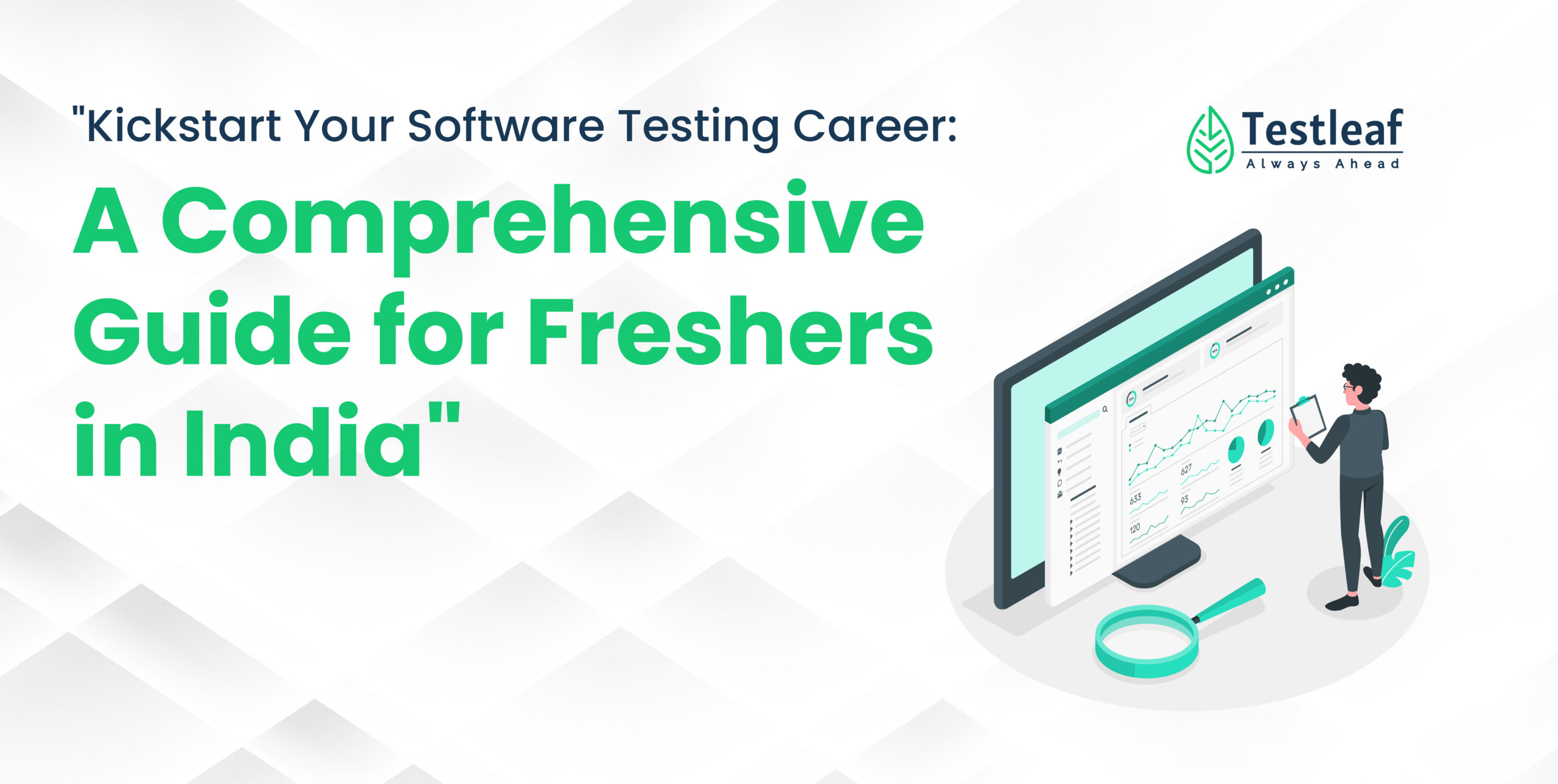Are you a fresh graduate dreaming of a career in software testing but feeling lost in the maze of job hunting? You’re not alone. The tech industry in India is booming, yet finding that perfect entry-level position can feel like searching for a needle in a haystack.
But what if you had a roadmap to guide you through this journey? Imagine having all the insider knowledge at your fingertips – from understanding what software testing really entails to mastering interview techniques that’ll make you stand out. That’s exactly what we’re offering in this Ultimate Guide to Finding Jobs in Software Testing for Freshers in India.
Whether you’re curious about the roles available, concerned about the impact of AI on testing jobs, or simply want to know how much you could earn, we’ve got you covered. We’ll walk you through everything from building a stellar resume to acing your interviews, and even share tips on how to start your career with a bang. So, are you ready to jumpstart your software testing career? Let’s dive in and explore the exciting world of opportunities waiting for you!
What is Software Testing ?
Software testing is the process of evaluating a software application to identify defects and ensure it meets specified requirements. It plays a crucial role in delivering high-quality software products, enhancing user satisfaction, and reducing maintenance costs.
Types of Software Testing
There are various types of software testing, each serving a specific purpose:
- Functional Testing
- Non-Functional Testing
- Manual Testing
- Automation Testing
Skills Required for Software Testing
To excel in software testing, freshers should develop the following skills:
- Analytical thinking
- Attention to detail
- Communication skills
- Basic programming knowledge
- Understanding of testing methodologies
- Familiarity with testing tools
Software testers need to be meticulous, patient, and have a knack for problem-solving. They should also be able to work effectively in teams and adapt to new technologies quickly.
As we move forward, we’ll explore how to prepare for a career in this dynamic field, equipping you with the knowledge and skills needed to succeed as a software tester in India.
Preparing for a Career in Software Testing

Essential Qualifications
To kickstart your career in software testing, a bachelor’s degree in Computer Science, Information Technology, or a related field is typically required. However, some companies may consider candidates with degrees in other disciplines if they demonstrate strong analytical and technical skills.
Certifications that Boost Your Profile
Obtaining relevant certifications can significantly enhance your employability. Here are some popular certifications for software testing freshers:
- ISTQB Certified Tester Foundation Level (CTFL)
- ASTQB Mobile Testing Certification
- Certified Agile Tester (CAT)
- HP Certified Professional (HP ATP)
Building a Strong Foundation in Programming
While not always mandatory, having programming knowledge can give you an edge in the competitive job market. Focus on learning:
- Scripting languages (Python, JavaScript)
- SQL for database testing
- Basic understanding of HTML and CSS
Developing Soft Skills
Technical skills alone are not enough. Cultivate these essential soft skills to excel in your career:
- Communication
- Attention to detail
- Problem-solving
- Time management
- Teamwork
| Hard Skills | Soft Skills |
| Programming | Communication |
| Test automation | Problem-solving |
| Bug tracking | Attention to detail |
| Test case writing | Time management |
As you prepare for your career in software testing, remember that a combination of technical knowledge, certifications, and soft skills will make you a well-rounded candidate. In the next section, we’ll explore various job roles available for freshers in the software testing field.
Job Roles for Freshers in Software Testing
As you embark on your software testing career, it’s essential to understand the various roles available to freshers. Let’s explore five key positions that offer exciting opportunities for newcomers in the field:
A. Manual Tester
Manual testers play a crucial role in ensuring software quality by meticulously examining applications without the use of automated tools. Their responsibilities include:
- Executing test cases
- Reporting bugs
- Verifying fixes
B. Automation Tester
Automation testers leverage scripting and tools to create and execute test cases efficiently. This role involves:
- Writing test scripts
- Maintaining test frameworks
- Analyzing test results
C. Performance Tester
Performance testers focus on evaluating how well a system performs under various conditions. Their tasks include:
- Designing load tests
- Analyzing system bottlenecks
- Recommending optimizations
D. Security Tester
Security testers identify vulnerabilities in applications to protect against potential threats. Key responsibilities are:
- Conducting penetration testing
- Assessing risk levels
- Recommending security enhancements
E. Mobile App Tester
With the growing mobile market, this specialized role involves testing applications across different devices and platforms. Mobile app testers:
- Test on various devices and OS versions
- Verify app functionality and usability
- Ensure compliance with platform guidelines
Here’s a comparison of these roles:
| Role | Technical Skills | Focus Area | Career Growth |
| Manual Tester | Low to Medium | Functionality | QA Lead |
| Automation Tester | High | Efficiency | SDET |
| Performance Tester | Medium to High | Scalability | Performance Engineer |
| Security Tester | High | Vulnerability | Cybersecurity Expert |
| Mobile App Tester | Medium | User Experience | Mobile QA Specialist |
Each of these roles offers unique challenges and opportunities for growth in the software testing field. As you progress in your career, you may find yourself specializing in one area or expanding your skills across multiple domains.
Growth Opportunities
The software testing field offers lots of chances to grow and move up. As a fresher, you’ll face new challenges and roles, like:
- Becoming an expert in certain testing methods or tools
- Moving into a lead or senior tester position
- Specializing in areas like Agile, DevOps, or performance testing
- Getting into test automation or management
- Looking at management roles in quality assurance or testing
With hard work, learning, and skill improvement, your career in software testing can go far.
The software testing world is always changing. Keeping up with new trends, tools, and practices can help you stand out in your job search and career.
Will AI replace testers?
As the field of software testing evolves, the question of whether artificial intelligence (AI) will replace human testers has become increasingly prevalent. While AI has made significant strides in automating certain aspects of testing, it’s unlikely to completely replace human testers in the foreseeable future.
Here’s a breakdown of how AI impacts software testing:
AI’s Role in Software Testing
- Test Automation: AI can efficiently execute repetitive tests and analyze large datasets.
- Predictive Analytics: AI algorithms can forecast potential issues based on historical data.
- Self-Healing Tests: AI-powered tools can adapt to minor UI changes, reducing maintenance efforts.
Human Testers’ Irreplaceable Skills
- Critical Thinking: Humans excel at identifying edge cases and unexpected scenarios.
- User Experience Evaluation: Testers provide invaluable insights into usability and user satisfaction.
- Contextual Understanding: Humans grasp complex business requirements and user needs better than AI.
| Aspect | AI Capabilities | Human Capabilities |
| Speed | Extremely fast | Slower, but more thorough |
| Consistency | Highly consistent | May vary, but adaptable |
| Creativity | Limited | Highly creative |
| Empathy | None | Can relate to user emotions |
While AI will continue to enhance testing efficiency, human testers will remain crucial for ensuring software quality, particularly in areas requiring judgment, creativity, and user-centric thinking. The future of software testing lies in the collaboration between AI and human testers, leveraging the strengths of both to deliver superior software products.
Top Companies in India Hire Software Testers
India is home to numerous renowned companies that actively recruit software testers, offering excellent opportunities for freshers to kickstart their careers. Here’s a look at some of the top companies and what they offer:
Major IT Services Companies
| Company | Notable Features |
| TCS | Largest IT services employer in India |
| Infosys | Known for its comprehensive training programs |
| Wipro | Strong focus on emerging technologies |
| HCL Technologies | Offers diverse testing roles across industries |
Product-based Companies
Several product-based companies also have a strong presence in India and hire testers:
Google: Known for its innovative testing practices
Microsoft: Offers cutting-edge projects in software testing
Amazon: Provides opportunities in both web and mobile testing
IBM: Known for its advanced testing tools and methodologies
Indian Startups and Unicorns
The booming startup ecosystem in India also presents exciting opportunities:
- Swiggy
- Zomato
- Flipkart
- Ola
These companies often offer dynamic work environments and the chance to work on rapidly evolving products.
With such a diverse range of companies hiring software testers, freshers have ample opportunities to find roles that align with their interests and career goals. Next, we’ll explore the salary expectations for QA testers in India, providing you with valuable insights for your job search.
What is the salary of a QA tester in India for freshers?
For freshers entering the software testing field in India, understanding the salary landscape is crucial. The compensation for entry-level QA testers can vary significantly based on several factors:
Factors Influencing Fresher QA Tester Salaries
- Educational background
- Location of employment
- Company size and reputation
- Skill set and certifications
Average Salary Range
| Experience Level | Salary Range (per annum) |
| 0-1 years | ₹2,00,000 – ₹4,00,000 |
| 1-2 years | ₹3,00,000 – ₹5,00,000 |
It’s important to note that these figures are approximate and can fluctuate based on the factors mentioned above. Fresher QA testers in metropolitan cities like Bangalore, Mumbai, and Delhi often command higher salaries compared to their counterparts in smaller cities.
Tips to Maximize Your Starting Salary
- Acquire relevant certifications (e.g., ISTQB)
- Develop programming skills (Python, Java)
- Gain practical experience through internships
- Stay updated with the latest testing tools and methodologies
As you gain experience and enhance your skills, your salary potential will increase significantly. Many QA testers see substantial growth in their compensation within the first few years of their career.
Now that we’ve explored the salary expectations for fresher QA testers, let’s move on to discuss how you can build an impressive resume to stand out in this competitive field.
Building Your Resume
When pursuing a career in software testing, crafting an impressive resume is crucial for freshers to stand out in a competitive job market. Let’s explore how to create a compelling resume that showcases your skills and potential.
Highlighting Relevant Skills and Projects
To catch the attention of potential employers, focus on showcasing your most relevant skills and projects. Consider including:
- Technical skills: List programming languages, testing tools, and methodologies you’re familiar with
- Soft skills: Emphasize problem-solving, attention to detail, and communication abilities
- Academic projects: Highlight any testing-related projects you’ve completed during your studies
Here’s a sample table to organize your skills effectively:
| Technical Skills | Soft Skills | Testing Tools |
| Java, Python | Problem-solving | Selenium |
| SQL | Communication | JIRA |
| HTML, CSS | Attention to detail | TestNG |
Crafting an Attention-grabbing Summary
Your resume summary should be concise yet impactful. In 2-3 sentences, highlight your:
- Educational background
- Key skills relevant to software testing
- Career aspirations in the field
Showcasing Internships and Practical Experience
Even as a fresher, you can demonstrate your practical knowledge:
- Include any internships or part-time roles in software testing
- Highlight volunteer work or personal projects involving QA activities
- Mention relevant coursework or certifications
Remember to tailor your resume for each job application, emphasizing the skills and experiences most relevant to the specific role. With a well-crafted resume, you’ll be better positioned to land interviews and kickstart your software testing career.
Finding Job Opportunities
Now that you’ve prepared your resume, it’s time to explore various avenues for finding software testing job opportunities in India. Let’s dive into the most effective methods for freshers to land their dream testing roles.
A. Online job portals
Online job portals are a goldmine for software testing positions. Here’s a comparison of popular job portals in India:
| Job Portal | Features | Best for |
| Naukri.com | Largest database, advanced filters | Wide range of opportunities |
| Indeed | User-friendly interface, company reviews | Comprehensive job search |
| LinkedIn Jobs | Professional networking, direct applications | Building connections |
B. Company websites
Many top tech companies in India have dedicated career pages on their websites. Regularly check these pages for fresher positions in software testing:
- Infosys
- TCS
- Wipro
- Accenture
- Cognizant
C. Networking events and job fairs
Attend industry events and job fairs to:
- Meet potential employers face-to-face
- Learn about company cultures
- Discover unadvertised job openings
D. Leveraging social media platforms
Social media can be a powerful tool for job hunting. Here’s how to use different platforms:
- LinkedIn: Join software testing groups, follow companies, and engage with industry professionals
- Twitter: Follow hashtags like #SoftwareTesting and #QAJobs
- Facebook: Join local tech communities and job groups
By utilizing these diverse job-hunting strategies, you’ll significantly increase your chances of finding the perfect software testing role. Next, we’ll explore how to ace the interview process and secure your desired position.
E.Look for Career Guidance Software Testing Course Providers Like Testleaf
If you’re a fresher aiming to start a career in software testing, enrolling in a course with a reliable training provider can make a significant difference. Providers like Testleaf offer more than just theoretical knowledge – they equip you with practical skills and industry insights that employers value. Here’s why you should consider such training:
- Comprehensive Curriculum: Testleaf and similar providers cover key areas like manual testing, automation testing, Selenium, and other tools used in the industry.
- Hands-on Projects: Learning by doing is the key. These courses often include real-world projects that simulate the challenges you’ll face on the job.
- Industry Mentorship: Experienced trainers provide personalized guidance and share tips on navigating the job market.
- Mock Interviews: Many training providers offer mock interview sessions to help you prepare for real-world job interviews. These sessions can boost your confidence, improve your communication skills, and familiarize you with the types of questions employers may ask.
- Placement Support: Many providers offer placement assistance, connecting you with job opportunities in reputed companies.
- Flexibility: With online and offline options, you can choose a format that suits your schedule.

Interview Process
Now that you’ve prepared your resume and found potential job opportunities, it’s time to focus on cracking the interview process. This crucial step can make or break your chances of landing your dream software testing job.
Common Interview Questions for Software Testers
Be prepared to answer below some examples of frequently asked questions:
- What is the difference between black box and white box testing?
- How do you write an effective test case?
- What is regression testing and why is it important?
- Can you explain the software testing life cycle?
Technical Assessment Preparation
Many companies include a technical assessment as part of their interview process. To excel:
- Practice coding problems on platforms like LeetCode or HackerRank
- Review fundamental testing concepts and methodologies
- Familiarize yourself with popular testing tools and frameworks
Demonstrating Problem-Solving Skills
Interviewers often present scenarios to assess your problem-solving abilities. Here’s a comparison of effective and ineffective approaches:
| Effective Approach | Ineffective Approach |
| Ask clarifying questions | Jump to conclusions |
| Break down the problem | Try to solve everything at once |
| Think aloud | Remain silent throughout |
| Propose multiple solutions | Stick to one rigid solution |
Showcasing Your Passion for Quality Assurance
Demonstrate your enthusiasm for software testing by:
- Discussing personal projects or contributions to open-source testing tools
- Sharing your knowledge of emerging trends in quality assurance
- Explaining how you stay updated with the latest testing methodologies
Remember, confidence and preparation are key to a successful interview. Practice your responses and be ready to showcase your skills and passion for software testing.
Starting Your Career Strong
Setting realistic expectations
As you embark on your software testing career, it’s crucial to set realistic expectations. Entry-level positions may involve routine tasks, but these lay the foundation for future growth. Expect a learning curve and be prepared to put in extra effort to master new tools and methodologies.
As you embark on your software testing career, it’s crucial to set realistic expectations. Entry-level positions may involve routine tasks, but these lay the foundation for future growth. Expect a learning curve and be prepared to put in extra effort to master new tools and methodologies.
Continuous learning and skill development
The tech industry evolves rapidly, making continuous learning essential. Stay updated with:
- Latest testing frameworks
- Automation tools
- Agile methodologies
- Domain-specific knowledge
| Skill Area | Importance | Ways to Develop |
| Technical | High | Online courses, certifications |
| Soft Skills | Medium | Communication workshops, team projects |
| Domain | Medium | Industry publications, webinars |
Building professional relationships
Networking is key in the software testing field. Attend industry events, join online forums, and participate in local tech meetups. These connections can lead to mentorship opportunities, job referrals, and valuable insights into industry trends.
Seeking mentorship opportunities
A mentor can provide guidance, share experiences, and help you navigate career challenges. Look for mentorship programs within your company or through professional associations. Remember, a good mentor-mentee relationship is built on mutual respect and a willingness to learn.
Now that you’re equipped with strategies to start your career strong, let’s wrap up with some final thoughts on succeeding in the software testing field.
Upshots
In the ever-evolving landscape of software development, testing remains a critical component, offering freshers in India a promising career path. As we’ve explored throughout this guide, the journey to becoming a successful software tester is multifaceted, requiring a blend of technical skills, industry knowledge, and personal development.
Remember, while the field may face challenges from AI and automation, human testers will continue to play a crucial role in ensuring software quality. By staying updated with the latest trends, honing your skills, and maintaining a passion for quality assurance, you can build a rewarding career in software testing.
As you embark on this exciting journey, keep in mind that perseverance and a growth mindset are your greatest allies. The software testing industry in India offers numerous opportunities for freshers, and with the right approach, you can carve out a successful and fulfilling career path.
Looking For best software testing course online or if you are from Chennai looking to join the best software testing institute in Chennai Testleaf is here to help you kickstart your career in software testing.
FAQ’s
What are the current industry trends and demands in the software testing field?
The software testing field is changing fast. There’s more focus on agile testing and automation. Also, there’s a big need for people who can keep up with these changes.
What types of testing roles are available for software testing freshers?
Freshers can find jobs like manual testers, automation engineers, and test analysts. These roles help you learn and grow in software quality assurance.
What are the essential skills required for software testing freshers?
Freshers need skills like analytical thinking and problem-solving. Good communication and knowledge of testing techniques are also key. Knowing how to write test cases and report bugs is important too.
How can software testing freshers build a strong foundation in manual testing?
To get good at manual testing, focus on learning the basics. Practice writing test cases and reporting bugs. Hands-on experience is essential for mastering these skills.
What are the must-have certifications for entry-level testing roles?
The ISTQB Foundation Level certification is highly valued. Tool-specific certifications, like Selenium, also show your expertise in automation testing.
How can software testing freshers create an impressive resume?
Highlight your relevant coursework, projects, and internships. Tailor your resume to the job you want. A well-formatted resume can make a big difference.
What are the top job opportunities for software testing freshers?
Freshers can find jobs at tech companies, software firms, and IT services. Salaries and growth chances depend on location, company size, and your skills.
How can software testing freshers prepare for technical interviews?
Learn common interview questions on manual and automation testing. Show you understand testing principles and can solve problems. This will help you stand out.
How can software testing freshers gain practical experience?
Build a portfolio with personal projects or open-source contributions. Practice on platforms like LeetCode or HackerRank. This will improve your skills.
What are some popular test management tools used in the industry?
Tools like Jira, TestRail, and qTest are widely used. They help manage test cases, defects, and team collaboration in agile environments.
How can software testing freshers enhance their professional development?
Network with professionals, join associations, and attend events. This keeps you updated and helps you find mentors and new opportunities.
We Also Provide Training In:
- Advanced Selenium Training
- Playwright Training
- Gen AI Training
- AWS Training
- REST API Training
- Full Stack Training
- Appium Training
- DevOps Training
- JMeter Performance Training
Author’s Bio:

As CEO of TestLeaf, I’m dedicated to transforming software testing by empowering individuals with real-world skills and advanced technology. With 24+ years in software engineering, I lead our mission to shape local talent into global software professionals. Join us in redefining the future of test engineering and making a lasting impact in the tech world.
Babu Manickam
CEO – Testleaf










